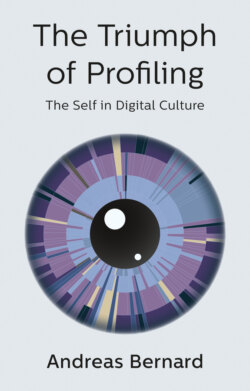The Triumph of Profiling

Реклама. ООО «ЛитРес», ИНН: 7719571260.
Оглавление
Andreas Bernard. The Triumph of Profiling
Table of Contents
List of figures
Guide
Pages
The Triumph of Profiling. The Self in Digital Culture
1. Profiles: The Development of a Format
A conceptual history of the profile in the twentieth century
The triumph of the self-made profile
Profiles and the culture of job applications
Constants of external control
Cyberspace and profiles: from the boundless to the captive self
Notes
2. Locations: GPS and the Aesthetics of Suspicion
The history of satellite navigation
On the way to locating individuals
Paradoxes of location
Electronic ankle bracelets
Location-based games
Notes
3. Cavity Searches: Bodily Measurements and the Quantified-Self Movement
Fitbit
Genealogies of self-tracking
Measuring, classifying, discriminating
Introspection and data generation
Lifting the veil
Witnesses for the prosecution
Notes
4. The Forgotten Fear of Registration. The drama of the census
The police as a catalyst of electronic registration
The semantics of the net
The glamour of datafication
Nineteen Eighty-Four from today's perspective
Stigmatization and self-design
Notes
5. The Power of Internalization
Competitive individuality
The governability of the self in digital culture
Notes
Works Cited
Index
POLITY END USER LICENSE AGREEMENT
Отрывок из книги
Andreas Bernard
.....
Weinreich was thus quite precise in choosing the name “SixDegrees” for the first online network of friends. After all, the contingency and frustrating evasiveness of social relations that gave the play its title could now, thanks to new communication technology, be restrained and used productively to at least the second degree. The format for organizing this confounding web of relations was the profile: a simple personal description that quickly and conveniently made every member identifiable to his or her circle of acquaintances. In the age of social media, the notion of the profile implicitly suggests that a con-man pretending to be Sydney Poitier's son would be found out in a matter of seconds. Even in this era of affirmative self-description, that is, the profile can still be useful to the police. The six degrees of separation between any two people, which on the eve of the digitalization of social relations could still drive the plot of a dark tale of deception, are now becoming transparent and traceable.
Although the self-made profile first appeared during the second half of the 1990s on social networks and online dating sites, the format soon emerged in a context that was not truly related to the new medium of the internet. In the genre of job-application manuals, which have been flourishing on the book market in conjunction with the gradual standardization of “job-application culture,” the concept quickly gained enormous popularity. In Germany, the books by Christian Püttjer and Uwe Schnierda have occupied a dominant position in such literature for the past 25 years. By now, the duo has produced more than 60 guidebooks of this sort, with titles such as Confidence in Interviews, Success in the Assessment Center, or The Definitive Job-Application Handbook (their magnum opus).29
.....